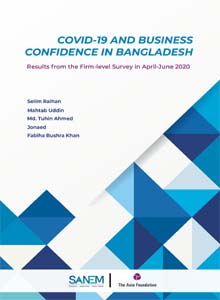COVID-19 and Business Confidence in Bangladesh: Findings from the 1st Round of Nationwide Firm-level Survey in July 2020
 Citation: Raihan, S., Uddin, M., Ahmed, M.T., Jonaed., & Khan, F.B. (2020). “COVID-19 and Business Confidence in Bangladesh: Results from the Firm-level Survey in July 2020”, SANEM Publications, Dhaka, Bangladesh.
Citation: Raihan, S., Uddin, M., Ahmed, M.T., Jonaed., & Khan, F.B. (2020). “COVID-19 and Business Confidence in Bangladesh: Results from the Firm-level Survey in July 2020”, SANEM Publications, Dhaka, Bangladesh.
Abstract: Bangladesh, like the rest of the world, is experiencing an economic contraction during this unprecedented crisis of COVID-19. According to the provisional estimates of BBS (2020), the Gross Domestic Product (GDP) growth of Bangladesh fell to 5.24 per cent in FY 2019-20 from 8.15 per cent in FY 2018-19. The country aims to achieve more than 8 per cent GDP growth rate in the next fiscal year (FY2020-21). Attaining such high economic growth would require rejuvenated confidence from the private sectors. Close monitoring of the businesses is required to assess the gaps in policies and expectations from the business communities. On this backdrop, this survey attempts to explore the outlooks and expectations of business communities on investment, employment, wages, stimulus packages, firm-specific financial performances, business costs, sales or exports, amongst others.
In this respect, this study convened a survey of 303 firms across the country (153 manufacturing; 150 services sector firms). Seven sub-sectors in the manufacturing industry and eight sub-sectors in the services industry were identified based on Bangladesh’s latest available National Accounts Statistics. The survey covers RMG, Textiles, Pharmaceuticals, Leather and Tannery, Light Engineering, Food Processing, etc. in the manufacturing sector. In the Services sector, this study covers Wholesales, Retails, Restaurants, Transport, ICT and Telecommunications, Financial Sectors, Real Estate, etc. The number of firms to be surveyed for each of the subsectors were chosen based on the sub-sectors’ contribution to the GDP.
Based on the survey responses, this study constructs three indices, namely – (i) Present Business Status Index in April-June 2020 compared to April-June 2019, (ii) (i) Present Business Status Index in April-June 2020 compared to January-March 2019, and (iii) Business Confidence Index for July-September 2020 compared to April-June 2020. The indices are first prepared at the firm level and later aggregated to the sub-sectoral and sectoral level incorporating appropriate weights.
The study shows that the overall business status in April-June 2020 was extremely poor for almost all industries. The worst performers were the RMG, leather, light engineering, wholesale and restaurant, while relatively better performers were pharmaceuticals and chemicals, and the financial sector. The business confidence for July-September 2020 shows some improvement over business status in April-June 2020. The improvement is visible in all sub-components of BCI, but still, the overall BCI remains slightly above the cut-off mark 50, meaning the confidence is improving but not much.
At the sectoral level, despite the improvement, RMG, leather, light engineering, and other manufacturing demonstrate BCI less than 50. These sectors are pessimistic regarding the improvement in the overall business scenario in Jul-September 2020 over April-June 2020. The major improvement on the BCI index is seen for Textile, Pharmaceuticals and Chemicals, Wholesale, Restaurant, ICT and Telecommunications, and Financial Sector.
The study also observes that on an average, the large firms performed better compared to the Micro, Small, and Medium Enterprises (MSMEs) in both PBSI and BCI indicators. However, it is observed that the BCI and PBSI scores of the exporting firms are significantly lower than the non-exporting firms on several indicators.
The study finds that only around one-third of the surveyed firms acquired the stimulus packages announced by the GoB. The firms who acquired the packages identified problems such as lengthy procedure, difficulty related to bank services, lack of information or difficulty in understanding the procedure, etc. as major problems faced. On the other hand, firms who did not avail the stimulus packages identified that the lack of packages for the respective industries, lengthy procedure, the fact that the package is not a grant, difficulty in obtaining information, etc. are the major barring factors.
Firms who availed the stimulus packages remarked the packages as effective in improving their business situation. It is observed that the firms who received the stimulus packages have a significantly better situation with respect to workers’ wages indicator on the PBSI score.
This study identifies several major challenges being faced by the industries during this crisis period. Corruption has been identified as a major problem by more than 90 per cent of the respondents. Amongst others, management of COVID-19 health crisis, poor trade logistics, unfavorable tax system, lack of access to finances, etc. were identified as major impeding barriers. Reforms in all these critical areas have remained long overdue.
